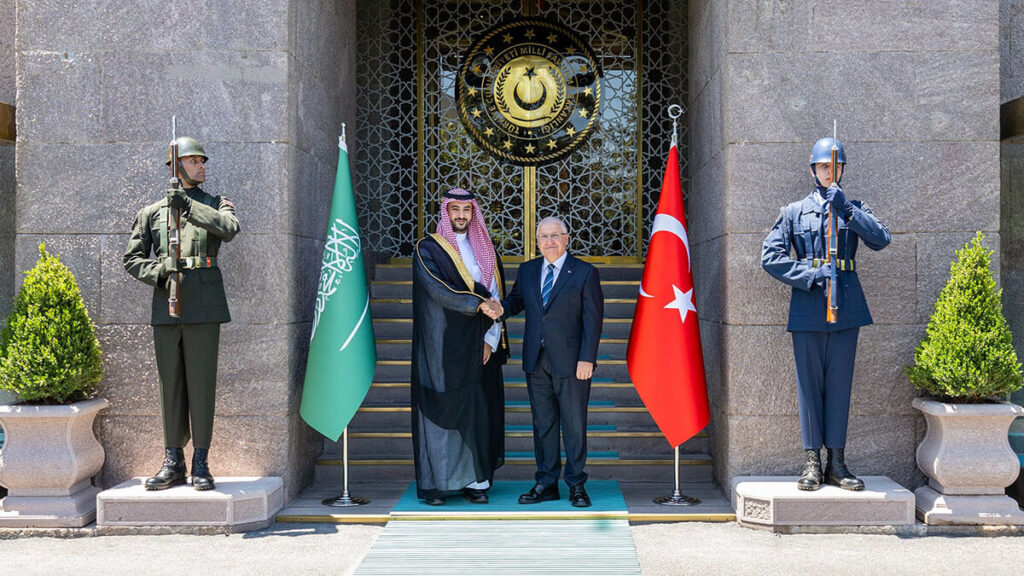Saudi Arabia Pursues Diversified Security Alliances Amid Shifting Global Dynamics
ANKARA/BEIJING – Saudi Arabia is actively seeking to diversify its security alliances, aiming to reduce its dependency on US arms exports. Following a visit to Beijing, Saudi Arabia’s Defence Minister, Khalid bin Salman, arrived in Ankara for closed-door meetings with Turkish President Recep Tayyip Erdogan and Defence Minister Yaşar Güler.
The discussions centered on forging new agreements to bolster the defence capabilities of both nations and ensure regional stability.
Strategic Diversification in Defence
Saudi Arabia’s effort to diversify its defence funding sources is a strategic imperative, given its pivotal role in the Middle East. The prince’s diplomatic missions to Ankara and Beijing exemplify Riyadh’s approach to reinforcing ties with other influential nations and diminishing reliance on the United States.
According to Al-Arab, the significance of these agreements is underscored by the heightened security concerns threatening Saudi Arabia’s territorial stability. The kingdom’s latest measures are seen as part of an unprecedented developmental plan prompted by proximate regional conflicts.
Economic and Defence Synergy
Beyond defence, economic competition is another critical dimension. Saudi Arabia, in collaboration with Turkey and China, seeks ways to strengthen their economies and mitigate US dependence.
Saudi Defence Minister Khalid bin Salman’s visit to Turkey holds significant implications, particularly in the realm of weaponry and defence systems. Turkey’s advancement in producing effective weapons positions it as a valuable partner for Saudi Arabia.
The minister’s earlier visit to Beijing also signifies a deepening of Saudi-Chinese relations within the defence strategy framework, following discussions with Zhang Youxia, Vice Chairman of China’s Central Military Commission.
Motivations Behind Diversifying Alliances
Saudi Arabia’s diversification strategy is driven by several factors, including changes in US foreign policy, tensions among Gulf states, Russia-China economic relations, and the complex situation in Yemen. These factors catalyze Saudi Arabia’s pursuit of renewed and novel defence agreements, exemplified by Prince Khalid bin Salman’s diplomatic missions.
Impact of US Elections on Saudi International Policy
This diplomatic activity coincides with speculation about a potential deal between Riyadh and Washington, where the US would bolster support for Saudi Arabia in exchange for improved relations with Israel. Observers from Al Arab suggest that normalizing ties between Riyadh and Tel Aviv, coupled with associated defence pacts, are intertwined with the electoral objectives of the US Democratic Party.
Saudi Arabia remains vigilant about the potential geopolitical upheaval that could accompany a Donald Trump re-election. Ensuring robust alliances is crucial for safeguarding its interests amidst growing Iranian influence.
China’s Growing Regional Influence
China’s ascendancy in the Middle East continues to shape regional dynamics. By investing heavily in infrastructure and ports, China has cemented its role as a critical player. Saudi Arabia and its partners, including Turkey, are keen on deepening ties with China to further reduce their reliance on the United States.
Conclusion
In summary, Saudi Arabia is actively redefining its international policy by forging diverse security alliances and enhancing economic cooperation with key global players like China and Turkey. These moves are strategic responses to shifting global dynamics and reflect Riyadh’s commitment to maintaining regional stability and asserting its autonomy in the face of evolving global influences.
Source: Al-Arab
